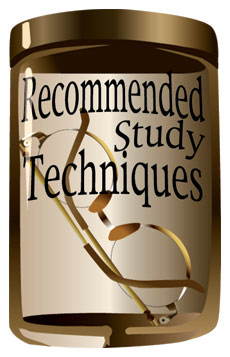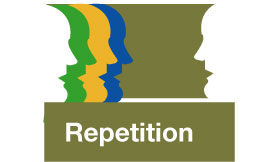![]()

Recommended Study Techniques
The conscientious use of proven study methods can help students to improve their mastery of subject materials and to improve their grades. Becoming familiar with subject materials is not the same as learning them. In a physiological sense, although LEARNING involves understanding, it is initially mostly a matter of REPETITION. The more exposure students have to their subject materials, the greater their chances of retaining and using that information. The more times a neuronal circuit (pathway) is excited (used) in the central nervous system (brain and spinal cord) the more that circuit is facilitated (remembers).
When students begin to study any of the sciences, such as microbiology, physiology, biology, zoology, botany, and anatomy, they must recognize that: 1) most of the information presented will be "new" to them, and 2) much of the vocabulary used to present this information will be unfamiliar. Studying a new course "in a different language" is more difficult than taking a "more conventional class". It is somewhat similar to studying the history of Czarist Russia with the instructor lecturing on the history in Russian. You would obviously need to master the language before you can master the history. Therefore, when studying any of the sciences as well as many other subjects you must learn the language in order to master the information.
The following techniques can be useful in any class where there is a large volume of information being presented and much of the vocabulary is new.
 |
1) Establish a schedule (similar to your class schedule) and extend it for a full 24-hour day, 7 days a week. Know when you have free time to study and use it. Schedule regular study times for yourself. Don't waste time sitting in the campus center, lounging on the lawn or watching mediocre TV. When you need to play, do so energetically, and when its time to study, do so intensely. Don't try to play and study at the same time. Studying can be enjoyable even if it is work. |
 |
2) Understand your physiology. Recognize when you are really alert and when you are sluggish mentally (like after meals or perhaps in the afternoons). STUDY ACCORDINGLY! Study when you are alert and have higher "energy" levels, not when you are tired or when you are bored doing everything else, first. |
 |
3) Complete all reading assignments before the lecture and/or laboratory session(s) on that topic. You will find this makes the lecture and laboratory material easier to understand. You will get more out of your class time and understand the material more thoroughly. Consider rereading sections, especially if the test materials are based on the text rather than lecture content. |
 |
4) As appropriate, be prepared to ask questions on points that are unclear to you after they have been presented in class. Probably others in class are unclear also. |
 |
5) Form study groups with other students in your class. Find some quiet study area to meet on campus where you can discuss what you have learned. Schedule time to meet together to review materials, compare understandings from class time, study materials and test each other. "Teaching" each other will increase your understanding of the information. Using information that you have just been exposed to by explaining it to others is one excellent method of learning. Making and reinforcing new physiological connections occurs as you speak the words and concepts. |
 |
6) Make sure your notes are complete. Do they accurately represent the information being presented? Most students write down less than half of the lecture material they receive orally, and this is often not adequate. If necessary, share notes with another student and/or invest in a small tape recorder and record lecture and laboratory presentations and reviews. Taped information can be reviewed before the next class session, and will allow you to fill in any gaps present in your notes. Reviewing taped lectures increases accuracy, and allows for REPETITION of the subject material even if it is time consuming. For example consider this, if your notes have only 60% of the material you need to learn, what is the maximum you are likely to achieve on the test. |
 |
7) Use flash cards for vocabulary. REPETITION IS LEARNING. Write each new term on one side of a 3X5 card along with the word define. On the other side of the card write out a complete definition for the term in the form of a question, leaving a blank space for the term being studied. This method will allow you to study for both definition and fill in the blank type questions as well as other formats. If you need to identify objects or species, try putting a picture or drawing on one side and its name or relevant information on the other. You will find that flash cards take time to make up, but are highly effective if used properly. For best results, do not attempt to put too much information (more than two new terms) on a single card. Review your stack of flash cards often; stick them in your pocket to review whenever you have a moment. As you master some of the cards, place them aside and concentrate on the ones you still need to "learn" until all the cards are mastered… then take a deserved (short) break! |
 |
8) Review is repetition; REPETITION IS LEARNING. Review each night before the next day's class. Pick up points on quizzes by studying for quizzes as hard or harder than you study for tests. Review several weeks ahead for finals. Often there is too much material that accumulates during the semester to cram at the last night. Get ahead of the crowd. Try simply reading and re-reading your notes from beginning to end at least three or four times a week. It will take less time each time you read them, and is more REPETITION. If you have reviewed ahead of time you have time to ask the instructor questions while others are feebly cramming. |
 |
9) Rewrite your lecture notes. It is time consuming but it is repetition. REPETITION IS LEARNING. Look up unclear portions. Write a second set of notes which contains only that information you could not immediately remember from your original notes. |
 |
10) Study efficiently; learn quickly what to expect in the way of testing from your instructor. Concentrate on what you need to learn, especially if time is short. If the instructor tests directly from lecture materials only, don't waste time excessively studying other sources of information, like the textbook. Does your instructor provide study guides, practice or sample tests to review or conduct review/study sessions. Take advantage of any or all provided. |
 |
11) Set small, attainable study goals (completing homework on time, "acing" the first quiz… or the second. If you are successful in attaining your initial goals, you will be encouraged to formulate and accomplish additional goals. Success feels good! |
 |
12) Review some schoolwork each evening before going to sleep. This is usually a very efficient learning technique as there is little or no interference with the formation of memory. This method is particularly valuable when trying to comprehend difficult subjects. |
 |
13) Consider an attitude change or perspective change. When you start a new class do you assume you must prove yourself on the first test? Do you assume it is an uphill battle to achieve your first high grade? Consider this instead… you already have an "A" on the first day that you arrive to class. Therefore, all you have to do during the semester is to maintain your "A". Is that not easier than "bringing your grade up". |
 |
14) Become interested in the subject area. Find aspects that are fascinating. Apply the material to your life and situation to make it "real". Think positive thoughts about the value of learning this information for meeting your future needs. It is harder to study if you dislike the subject and think that the information is useless. If necessary, ask your teacher to help you discover how the subject is relevant to your life. |
DID WE MENTION ?

These techniques, when used properly, yield a high degree of success.
If you force yourself to use them (over and over again), establish a regular pattern and follow it, you will be successful. "Hit and miss" study habits result in "hit and miss" learning and yield "hit and miss" grades. Consider your role as a student analogous to a sharpshooter; with practice you can be one of the best, but without it you're just average. The more you learn to really study, the faster you will learn. The more you practice these studying skills, the easier it will get and the better you will be at it. Being a student that studies is work; it is a rewarding job.

Copyright 2002 Sierra College Biological Sciences Department
Last updated: 07/22/04